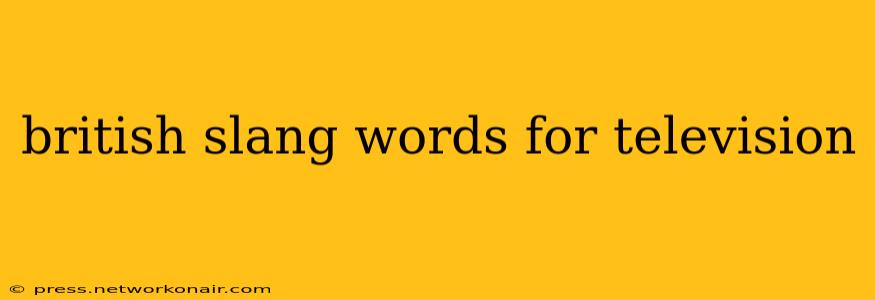The British Isles boast a rich tapestry of slang, and the humble television is no exception. From affectionate nicknames to cheeky colloquialisms, the words Brits use for their tellies reveal a playful relationship with this ubiquitous piece of technology. This guide delves into the fascinating world of British slang for television, exploring its history and variations across different regions and generations.
What are some common British slang terms for TV?
This is perhaps the most frequently asked question, and the answer depends largely on context and regional dialect. However, some of the most common terms include: the telly, the box, and the gogglebox. "Telly" is arguably the most widely understood and accepted term, while "box" is a more concise and informal option. "Gogglebox" is a more playful and descriptive term, referencing the act of staring intently at the screen.
What's the history behind these slang terms?
The evolution of slang for television mirrors the technology's own journey. "Telly," a contraction of "television," emerged early on and quickly gained widespread adoption. Its simplicity and ease of pronunciation cemented its place in British vernacular. "Box," a naturally evocative term referencing the physical shape of early television sets, also gained popularity. Its enduring use reflects the lasting power of simple, descriptive slang. The more recent "gogglebox," while not as old, has also become widely used, likely stemming from the image of eyes glued to the screen.
Are there regional variations in British slang for TV?
While "telly" enjoys widespread use, regional variations do exist. Certain areas might favor one term over another, or use entirely different slang specific to that locale. For example, some older generations might still use terms that are less common now, reflecting the era in which they learned the slang. These regional differences add to the rich diversity of British slang, making it a dynamic and ever-evolving aspect of the language.
What other slang words are used to describe watching TV?
Beyond the names for the television itself, there's a whole lexicon of slang related to the act of watching it. You might hear phrases like "glued to the box," "zoning out in front of the telly," or "binge-watching" (a more recent addition, reflecting the rise of streaming services). These terms highlight the various ways people engage with television, from casual viewing to immersive binging.
Is there slang for specific types of TV programs?
Yes, absolutely! British slang extends beyond just the television itself. Different program genres often have associated slang terms. For example, a "soap" refers to a daily serialized drama, while a "Telenovela" refers to a melodramatic serial drama from Latin America. These terms often carry connotations, implying certain tropes or viewing habits related to those programs.
Why do Brits use slang for television?
The use of slang often stems from a desire for informality, brevity, and a sense of shared cultural identity. Slang terms for television help to create a sense of camaraderie and familiarity, allowing speakers to express themselves in a way that feels more natural and less formal. It's a reflection of the informal and often humorous nature of British culture. The slang reflects a relationship with the television itself, from simple affection to perhaps even a mild mocking of its power to captivate its audience.
This exploration of British slang for television showcases the vibrancy and evolution of the language. It’s more than just a list of synonyms; it’s a window into the cultural relationship between the British public and their beloved television sets. From "telly" to "gogglebox," the playful language surrounding this technology reflects a unique and enduring connection.

